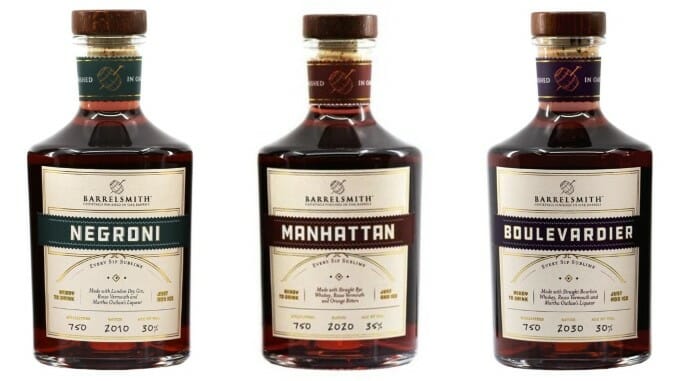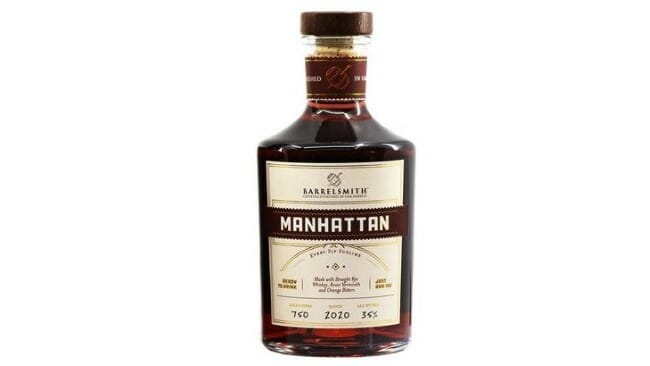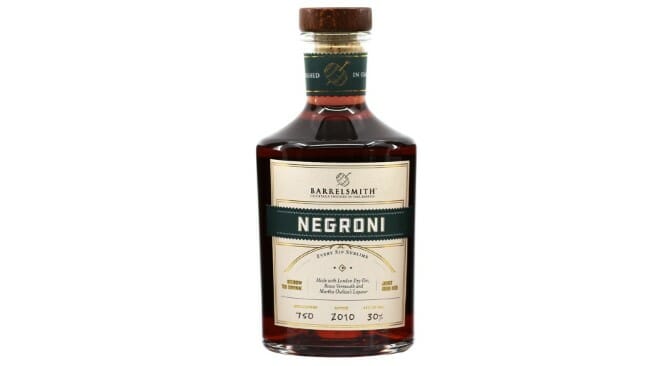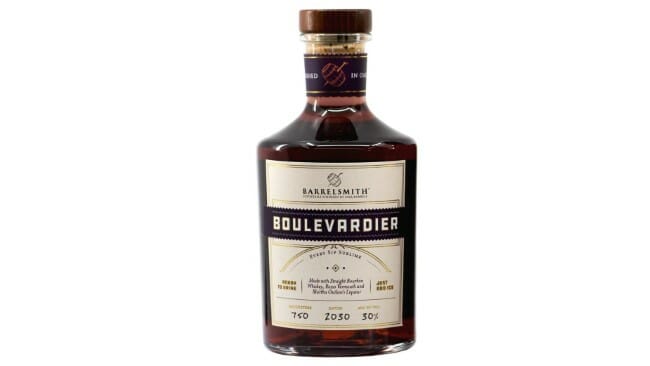Tasting: 3 Bottled Cocktails from Barrelsmith (Manhattan, Negroni, Boulevardier)
Photos via Barrelsmith
In the last year, I’ve tasted quite a range of pre-mixed, bottled, canned or otherwise ready-to-drink (“RTD”) cocktails, and I’ve seen both the highs and the lows that this rapidly growing segment has to offer. At their best, the most effective RTD cocktail brands tend to embrace simplicity and quality ingredients: Brands such as Golden Rule or Post Meridiem are not shy about telling the consumer exactly what is in each 100 ml can, and that transparency is almost always in service of better drinks. But on the flip side, the segment is also filled with a certain hucksterism that implies a very low opinion of the consumer’s intelligence, and this results in bastardization of classic cocktail recipes such as the mai tai, which has been absolutely butchered by numerous companies. In other words, there’s a very big gulf that exists between the lower and higher quality entries in this field.
And after tasting Barrelsmith’s line of bottled cocktails, I believe that gulf just got bigger. Not because there’s anything wrong with these drinks, mind you, but because there’s so much right with them. These are pre-mixed cocktails that feature a level of assertiveness and sophistication I haven’t yet encountered in this genre, built around homemade liqueurs that allow Barrelsmith to put their own, individual stamp on each recipe. Put simply, these bottled cocktails are unabashedly good, and I think they represent the RTD field taking a major step forward.
There are only three existing cocktails from Barrelsmith, which has apparently been around since at least 2020, but I’ve only recently become aware of them. All three cocktails are built to feature the company’s own proprietary ingredients, either in the form of their homemade sweet vermouth (they refer to it as “rosso vermouth”), or their house-made Martha Outlaw’s Liqueur. That’s in reference to co-founder Martha Outlaw, who operates Barrelsmith alongside partner Matt Ellenthal. The titular liqueur, meanwhile, is a citrus-accented very of the classic Italian “bitter red liqueur,” effectively meaning that this is the company’s homemade replacement for Campari. To which I could only say: What? They went out and made their own Campari analogue, rather than just using Campari in their cocktails? How confident were they in this liqueur, that they thought it would be superior to one of the most essential liqueurs for any home bartender to own?
As it turns out: Pretty confident, and rightly so. The homemade aspects of Barrelsmith really feel like one of the keys to its success, as does the fact that all three cocktails—Manhattan, Negroni and Boulevardier—are barrel aged in oak before being bottled. They’re then offered in 750 ml bottles, which I must confess is not necessarily my favorite format for these types of RTD cocktails—I tend to prefer individual serving sizes, rather than a big bottle that is likely to be at least partially wasted. But regardless, I can’t fault the quality of the liquid being packaged. Granted, they’re pretty pricey, with MSRPs around $38 for each of the bottles, and are currently sold in a handful of states, with home delivery available in 40 states.
So with all that said, let’s get to tasting and see what makes these Barrelsmith cocktails so remarkable in their field.
Barrelsmith Manhattan

Barrelsmith’s Manhattan cocktail is made with sourced straight rye whiskey—the company doesn’t disclose its sources—along with house made rosso vermouth and Barrelsmith orange bitters. It’s then barrel aged, and bottled at a particularly robust 35% ABV (70 proof). I have no doubt that this robust strength is part of what ultimately makes this Manhattan so successful, as this is notably stronger than most pre-mixed Manhattans on the market. In fact, I rather wonder if the rye whiskey used here would have had to have been stronger than the standard 80 proof, in order for any normal Manhattan ratio to ultimately give you a final strength of 70 proof. Again, a point in Barrelsmith’s favor.
On the nose, this Manhattan is toasty, with notes of toasted oak, jammy red fruit, and cocoa nibs. There’s a slight char present, and a whiff of coffee. On the palate, this is quite rich, fairly sweet and vinous, with notes of toasted oak and cocoa that are supporting by trailing bitterness. Vanilla is also prominent, as are herbals and traces of tobacco, while the bitterness advances somewhat throughout and helps balance what is otherwise on the sweeter side. The strength is enough to give it a slight ethanol presence, and a warming in the chest.
All in all? Pretty easily the most boldly flavorful pre-mixed Manhattan I’ve ever encountered, a massive success both in terms of assertiveness and complexity of flavors. I did not think that such a punchy and layered canned version of the Manhattan existed, but I’m happy to be proven wrong. Even someone who is serious about home mixology should find themselves impressed by this bottle, and there’s really no higher compliment I can pay than that. Extremely impressive.
Barrelsmith Negroni

The Barrelsmith Negroni and Boulevardier bottles are a little bit less conventional than the Barrelsmith Manhattan, primarily because so much of their conception and flavor profile is based around the company’s own proprietary liqueur, Martha Outlaw’s Liqueur. As stated above, this is effectively a replacement for Campari in terms of how they’ve chosen to use it in these recipes. The owners could say that Martha Outlaw’s Liqueur isn’t necessarily meant to compare 1-1 with a product like Campari, but if you’re using it in a Negroni—a recipe where Campari is an absolute necessity—then it’s the comparison one has to make. One might then ask “Why make your own version of Campari if you’re just going to make it very similar to Campari?” I can only presume that’s what Martha Outlaw must have asked herself, because what they settled on feels notably distinct rather than trying to replicate one of the world’s best-known liqueurs. The product is bottled at a robust 30% ABV (60 proof).
This negroni—made with gin, rosso vermouth, the aforementioned liqueur, and aged in oak barrels—has strong citrus impressions on the nose, along with resin and herbals. Minty, with a big lemon verbena/orange peel aromatics, it leads into what proves to be a kinder and gentler Negroni profile on the palate. This is quite a bit less bitter than one expects of the classic Negroni made with the old, reliable 1/1/1 ratio, which personally has always been a ratio too heavy on the Campari for my taste anyway. This version is considerably sweeter on the palate, and slightly syrupy in texture, with pine and juniper berry fruitiness, and a slight black tea maltiness. It drinks quite easily despite the proof, less bracing and dry than the traditional Negroni. I question whether a purist would even define it as a Negroni per se, but it’s quite a tasty drink judged solely on its own merits.
Barrelsmith Boulevardier

The Barrelsmith Boulevardier is simply the whiskey-based spin on the Negroni, albeit this time it’s bourbon rather than the straight rye used in the Manhattan recipe. Like the Negroni, though, this one is also secondarily aged in oak barrels after mixing, and bottled at 30% ABV (60 proof).
On the nose, this one is darker and a bit more muted, though I’m getting some more of those nutty, cocoa-like and slightly roasty notes that were present in the Manhattan. On the palate, it turns more herbaceous, and there’s definitely some tobacco there, but it’s lost the resin and mint present in the Negroni—suggesting that those elements were contributed primarily by the gin, rather than the Martha Outlaw’s Liqueur. This Boulevardier, meanwhile, is pretty sweet on the palate, perhaps a bit overly sweet for some drinkers, with expressive notes of sweet citrus and red fruit, caramel, vanilla and milk chocolate, slowly drawing into mild bitterness after a good while. Quite tasty, all in all, but this drink is inherently more unbalanced in favor of sweetness thanks to the swap from gin to bourbon, and the lack of a more intense bitterness in Barrelsmith’s house liqueur.
Potentially of note: The Manhattan and Boulevardier both instruct the drinker to “just add ice,” so these are perhaps meant to be diluted at least slightly. That would explain on some level how assertive these bottled cocktails are, but in my eyes that’s a positive. I’ve never been a big fan of the Manhattan over ice, but this is the rare example of one that I believe could actually stand up to it. Regardless of whether one ultimately chooses to dilute these, they have the verve to stand out quite well on their own.
Jim Vorel is a Paste staff writer and resident liquor geek. You can follow him on Twitter for more drink writing.







































